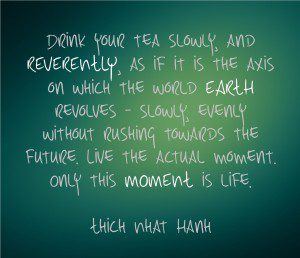Contributing Writer for Wake Up World
Enjoying an unhurried meal may have more advantages than previously thought. In a world of increasing speed, the idea of leisurely savoring a bite to eat can seem just plain crazy. But ancient wisdom, modern science and a grassroots movement have all come to the same conclusion: eating mindfully is good for us.
Mindful Eating – The Pleasure of Leisure
Epicurus (b.341 BCE) is most famously known for his freewheeling indulgence of pleasure. Founding a school in Athens called the “Garden,” he has long been associated with gluttony and excess. Nevertheless, the reputation of Epicurus isn’t entirely accurate. He did advocate a life of intelligent pleasure, which was coupled with the wisdom that simplicity will bring the greatest joy. Jules Evans of Philosophy For Life explains:
[pro_ad_display_adzone id=”110028″]
“Epicurus said that, for each belief or action, we should consider the pleasure it will lead to, and the pain, and then ‘measure the one against the other’. Some activities lead to a short-term spike in pleasure, such as heavy drinking, but ultimately lead to pain, in the form of hangovers, sick bodies and damaged relationships. We should restrict our desires to what is necessary and easy to attain, Epicurus says. So actually, contrary to the popular image of Epicureans as libertines, Epicurus and his followers lived quite austere lives, following a simple diet and not having many possessions.”
As part of a Epicurean way of life, the philosopher heavily advocated slowing down and living in the present — including how we eat. Regardless of how simple a meal may be, when we take a moment to breathe and focus on the moment, our pleasure will increase subtantially. Compare this with powering down a sack meal from Burger King as we frantically drive to our next stress-fueled activity. Not only is savoring the textures, taste and aroma of our meal more pleasurable, but research has shown that our health can benefit too.
The Science Behind a Leisurely Meal
Not surprisingly, when we eat slowly, we consume less food and calories overall — which can help us maintain a healthy weight and avoid health issues down the line.
 Research published in the Journal of the Academy of Nutrition and Dietetics found that by taking more time to chew, meal size was reduced in normal weight, overweight and obese participants. The randomized cross-over trial included 18- to 45-year-old adults and established a baseline of food chew rate for each person. Participants were asked to chew each portion of food within a certain percentage of their baseline number of chews. The research team discovered that “[f]ood intake in the sessions with 150% and 200% of their baseline number of chews was reduced significantly, by 9.5% and 14.8%, respectively, compared with the 100% session.”
Research published in the Journal of the Academy of Nutrition and Dietetics found that by taking more time to chew, meal size was reduced in normal weight, overweight and obese participants. The randomized cross-over trial included 18- to 45-year-old adults and established a baseline of food chew rate for each person. Participants were asked to chew each portion of food within a certain percentage of their baseline number of chews. The research team discovered that “[f]ood intake in the sessions with 150% and 200% of their baseline number of chews was reduced significantly, by 9.5% and 14.8%, respectively, compared with the 100% session.”
Subjective appetite at meal termination was also taken into account. The team concluded that increased chewing during a meal lowered food intake and can potentially be applied as a behavioral strategy for body-weight management.
But this isn’t just about chewing our food throughly and reducing intake. When we add a degree of mindfulness, we are able to appreciate our meals more fully.
The Joys of Mindful Eating
Thich Nhat Hanh, a Vietnamese Buddhist monk, believes that we can look at food in a way which connects us to everything. We can name each dish, while valuing the time and care that went into the meal. We can give thanks for wholesome food that is free of harmful additives, toxins and GMOs. Likewise, we can feel gratitude for the farmers and others who made the food possible. In Buddhist practice centers, it’s commonplace to enjoy meals in silence, fully engaging all the six senses without distraction. For most people, however, a good start is to simply turn off the television, the laptop and the cell phone.
 Thich Nhat Hanh also advises that food be served in modest portions and that we savor small bits by chewing thoroughly. It’s helpful to put your eating utensils down between each bite. Notice your breath and don’t rush. Conversations should focus on topics which foster gratitude and connection to the food and each other. Vegetarianism and purchasing local foods is also recommended.
Thich Nhat Hanh also advises that food be served in modest portions and that we savor small bits by chewing thoroughly. It’s helpful to put your eating utensils down between each bite. Notice your breath and don’t rush. Conversations should focus on topics which foster gratitude and connection to the food and each other. Vegetarianism and purchasing local foods is also recommended.
For further details about the principles behind mindful eating, have a look at this excerpt from Thich Nhat Hanh’s book, “Savor.”
A Global Grassroots Movement
In a similar spirit, a movement which began in the late 1980s also encourages slowing down and appreciating our meal. In response to a proposed McDonalds at the Spanish Steps in Rome, Slow Food was born with the intent of defending regional tradition, gastronomic enjoyment, good food and a slow pace of life. Today, with a membership of over 100,000 people around the globe, each local chapter organizes events in their community — including simple shared meals and tastings, visits to local producers and farms, film screenings/festivals, taste education classes for children and adults, promotion of farmers’ markets and supporting international campaigns. An organization for good, clean and fair food, Slow Food is all about uniting “the pleasure of food with responsibility, sustainability and harmony with nature,” declares founder and president Carlo Petrini.
To find a chapter near you or to become involved, visit Slow Food International for more information.
Article sources:
- http://philosophyforlife.org/philosophies-for-life/epicureans/
- (http://www.andjrnl.org/article/S2212-2672(13)01375-0/abstract
- http://www.andjrnl.org/article/S2212-2672(13)01673-0/abstract
- http://psychologyofeating.com/metabolic-power-pleasure/
- http://life.gaiam.com/article/zen-your-diet
- http://www.slowfood.com/international/7/history
Previous articles by Carolanne:
- First U.S. City Produces More Electricity Than It Uses — With 100% Renewable Technology
- Dry Skin Brushing Can Strengthen Immunity, Spark Detoxification and Reverse Aging
- Cannabis Dissolves Cancerous Tumor in Young Infant, Deemed ‘Miracle Baby’ by Physician
- Report Finds Cancer Deaths Have Doubled in Argentina’s GMO Growing Regions
- Is Mold Making You Sick?
- Why Everyone Should be Eating More Hempseed
- Autistic Boy with Higher IQ Than Einstein Discovers Gift After Removal from State-Run Therapy
- Enhance Spiritual, Mental and Physical Well-being with a Pineal Gland Detox
- DIY $2 Self-Watering Garden Bed – Grow Produce Easily, Even in the Toughest Conditions
- How Being Too Clean Can Lead to Cancer, Multiple Sclerosis, Celiac Disease and More
[pro_ad_display_adzone id=”110025″]
[pro_ad_display_adzone id=”110027″]







